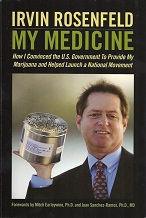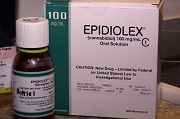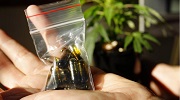DEA Compares Home-Grows to Meth Houses
Leave it to the DEA to compare growing your own pot at home to the “meth houses of the 1990s.”
In a puzzling new report, the DEA claims that Colorado’s homegrown pot has led to large-scale operations that risk occupants, neighbors and first responders because of a series of conditions that will probably remind most people of their...
Fed Study Finds Medical Marijuana Laws Calm Cannabis Fears
How worried are you about the health risks of occasional cannabis consumption? It probably depends on whether you’ve experienced life in a medical marijuana state.
A new study published by a branch of the U.S. Department of Health and Human Services reveals a strong correlation between whether a state has legalized medical marijuana and how concerned residents are about health risks.
The report, published Tuesday by SAMHSA, the Substance Abuse and Mental Health Services Administration, compares cannabis use rates to the perceived risk of harm from consuming cannabis once per month. Medical marijuana states, where people have experienced the reality of medical cannabis use in their own communities, tend to have much lower perceptions of risk and fear than states where both medical and recreational use remains illegal.
The study relied on data drawn from the National Survey on Drug Use and Health from 2012 through 2014, so it tells us little about the effect of adult-use legalization. (Colorado began selling retail cannabis in January 2014, Washington state in July of that year.) But many medical marijuana programs were up and running during the study period, and the correlation is striking.
When asked whether they believed there was a “great risk of harm” from smoking cannabis once a month, 29 to 36 percent of people in non-legal states like Texas, Utah, and Oklahoma said yes. In experienced medical marijuana states such as Oregon, Colorado, New Hampshire, and Rhode Island, only 19 to 21 percent of people felt there was a great risk of harm from once-monthly consumption.
Those opinions correlated with actual monthly use. Oregon, which registered one of the lowest perceptions of harm, also notched a relatively high percentage of residents (12 percent) who consumed at least once in the past month. In Texas, 36 percent of respondents saw monthly use as high-risk, and only about 5 percent of people said they’d consumed in the past 30 days.
Curiously, officials at SAMHSA reported the results of their study as a warning about the dangers inherent in lowering the nation’s level of fear about cannabis. Fran Harding, director of SAMHSA’s Center for Substance Abuse Prevention, told USA Today: “What really is the strongest message that we hope people take from this is the connection between perception of risk and how that, in turn, dictates the use rates. Our prevention programming is through what we call a ‘risk and protection framework.’ So if there is high perception of risk there is going to be a lower use rate. The lower the perception of risk, the higher the use rates are."
That’s one way of looking at the data. SAMHSA officials, who still consider it their duty to prevent all cannabis use, look at the numbers and see a state’s subsiding cannabis fears driving an increase in consumption. It’s a flawed model based on a failed notion: that instilling irrational fear of cannabis will scare people away from consuming it. The government has done that for 80 years and it hasn’t worked.
Here’s another way of looking at the same data. Maybe it’s the case that people who have experienced the reality of medical cannabis use, who’ve seen their neighbors and family members benefit from its relief, have noticed that their previous fears about cannabis have proven to be largely unfounded.
Marijuana is not a completely “safe” substance. Neither is alcohol, Advil, cough syrup, or caffeine. Cannabis is a substance that can be legalized, regulated, and treated appropriately, with full knowledge of fact-based risk, by adults in a modern state. As more and more states allow both medical and adult use of cannabis, those previously irrational fears will continue to subside. SAMHSA officials believe risk perception drives consumption. What they have yet to acknowledge is that experience also drives perception.
Cannabis Australia: Queensland children with severe drug-resistant epilepsy eligible for medical marijuana trial
Medicinal cannabis trial, announced in 2015, will now be available to Queensland children who have severe drug-resistant epilepsy. They can take part in the medical marijuana clinical trial after a deal signed with a British drug company. The State Government signed a memorandum of understanding with GW Pharmaceuticals to access Epidiolex, a liquid form of pure cannabidiol.
Now the State Government is calling on parents who have children suffering from persistent seizures if they want to be part of the medical marijuana trial, revealed Health Minister Cameron Dick. The trials will be developed by the research team from the Lady Cilento Children's Hospital in Brisbane.
RELATED: Cannabis-based drug Epidiolex to be given to 40 NSW children with the worst cases of epilepsy
As per Dick, the project is driven by two things — compassion and hope. Experts are hopeful that Epidiolex would provide relief to the children suffering from such a terribly debilitating condition.
It has also been revealed that the study would not be randomised, meaning, none of the participants would be on placebo. Each and every participant would take the cannabis-based drug Epidiolex.
Children's Health Queensland's executive director of medical services, Dr. Andrew Hallahan, said that all the children would have their drug dose gradually increased over a period of months.
“It's really a study to examine in the first instance — tolerability — how safe it is and get an idea of its potential efficacy. At its best, what we would have is another option for specialist doctors from paediatric neurologists to offer to help children. The initial studies that I have seen don't indicate that it's going to be a miraculous cure for epilepsy and all drugs have their side effects. That's part of why we're doing this as a proper trial to make sure we know what's going on,” Hallahan told the ABC.
The trials are expected to begin before the end of the year and will be part of a $6 million State Government spend. It will also include establishing a specialist research centre. The trials would be run as part of the compassionate access scheme.
Cannabis campaigners call for patients' amnesty | poll
A Riverina woman who turned to cannabis to deal with crippling pain has joined a chorus of campaigners calling for an amnesty on patients using medical cannabis.
Griffith veterinary nurse Kelly Cameron said patients “absolutely” needed an amnesty from prosecution.
“Without it they’re completely in pain,” she said. “You wind up having to be a criminal to be a productive member of society.”
Ms Cameron said a friend of hers was about to go to prison in Western Australia simply for trying cannabis oil for pain relief. The oil has no psychoactive properties, meaning patients can’t use it to get ‘high’.
“People want to take care of their health but at the moment they have to live illegally,” she said.
“It affects work, day-to-day life, they just can’t function.”
Cannabis campaigner Lucy Haslam began calling for access to medical cannabis after her son, Daniel, started using the illegal drug as part of his cancer treatment.
The young man was so affected by chemotherapy he would vomit uncontrollably and cannabis was the only thing that could stop it. Eventually, he used cannabis for pain relief before he died from cancer at the age of 25.
“I think there needs to be recognition that many people get a great benefit from medical cannabis,” Mrs Haslam said.
“Sadly, the wheels of bureaucracy turn very slowly and we need an amnesty for people who use this incredible drug.
“Cannabis is so benign, I’m sure in years to come it will come to be considered a wonder drug.”
While the NSW Government had established the Terminal Illness Cannabis Scheme, Mrs Haslam said it had a lot of flaws.
“It’s a poorly thought out scheme,” she said. “The name was a big problem for Daniel, who wants to be part of that club?
“He never wanted to accept his illness was terminal.”
Ms Cameron said if NSW Premier Mike Baird could abolish greyhound racing, seemingly overnight, then he could certainly help patients living in fear.
“He would be doing NSW a favour if for his next trick he could do something positive and create a ‘whole plant’ natural cannabis industry,” she said.
“Give this industry back to the farmers who created it and open up new employment opportunities to those who have been negatively affected by unfair and unjust cannabis testing regimes.”
There is a poll setup at the page link below regarding should medicinal marijuana be subject to an amnesty?
There also lies the question, can patients on medical cannabis that have high levels of THC drive safely? click here to listen to a man who has driven to work after smoking 3 joints every day for the past 30 years without incident and he does it legally.
reference: http://www.braidwoodtimes.com.au/story/4054778/patients-call-for-cannabis-amnesty/?cs=2452
Latest
Coronavirus Strikes Massachusetts Cannabis Company Employees
Reassessing the Essential: Cannabis in the Time of a Pandemic
5 Reasons To Try Aspen Valley CBG Flower (30% Off)
High Times Cannabis Cups Go Virtual In Wake Of Coronavirus Pandemic
Drug Enforcement Administration Proposes Plan To Expand Cannabis Research
Ghana Legalizes Cannabis For Medicinal And Industrial Uses
The cheapest legal weed in Canada: Discover these cannabis ‘value brands’
Cannabis and coronavirus: Here’s what you need to know
cannabis designs
The Best Of
WHO Rules CBD Should Not Be a Scheduled Drug

Dr Cristina Sanchez PhD video interview on medical marijuana and cancer

Biochemist Dennis Hill interview; Cannabis oil as a cure for cancer.

The unofficial World Record holder for cannabis smoking part 1









